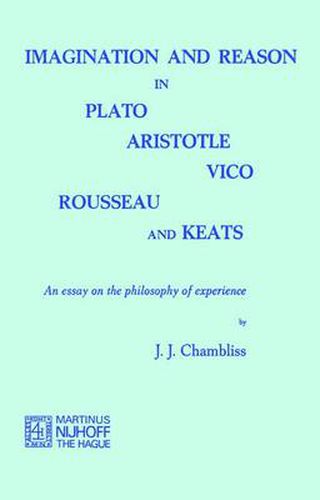Readings Newsletter
Become a Readings Member to make your shopping experience even easier.
Sign in or sign up for free!
You’re not far away from qualifying for FREE standard shipping within Australia
You’ve qualified for FREE standard shipping within Australia
The cart is loading…






This title is printed to order. This book may have been self-published. If so, we cannot guarantee the quality of the content. In the main most books will have gone through the editing process however some may not. We therefore suggest that you be aware of this before ordering this book. If in doubt check either the author or publisher’s details as we are unable to accept any returns unless they are faulty. Please contact us if you have any questions.
The present essay grew out of an inte:rest in exploring the relationship be tween imagination and reason in the history of naturalistic thinking. The essay tries to show something of the spirit of naturalism coming to terms with the place of imagination and reason in knowing, making, and doing as activities of human experience. This spirit is discussed by taking as its point of departure the thinking of five writers: Plato, Aristotle, Giam battista Vieo, Jean-Jacques Rousseau, and John Keats. Plato and Aristotle are considered as spokesmen of reason in a world which appeared to be dominated by non-reason. They found it essential for human beings to try to learn how to distinguish between the work of imagin ation and the work of reason. In trying to make such a distinction, it becomes clear that imagination has its legitimate place, along with reason, in human activity. Or we might say that determining the place which each has is a continuing problem when human beings take seriously what is involved in shaping mind and character.
$9.00 standard shipping within Australia
FREE standard shipping within Australia for orders over $100.00
Express & International shipping calculated at checkout
This title is printed to order. This book may have been self-published. If so, we cannot guarantee the quality of the content. In the main most books will have gone through the editing process however some may not. We therefore suggest that you be aware of this before ordering this book. If in doubt check either the author or publisher’s details as we are unable to accept any returns unless they are faulty. Please contact us if you have any questions.
The present essay grew out of an inte:rest in exploring the relationship be tween imagination and reason in the history of naturalistic thinking. The essay tries to show something of the spirit of naturalism coming to terms with the place of imagination and reason in knowing, making, and doing as activities of human experience. This spirit is discussed by taking as its point of departure the thinking of five writers: Plato, Aristotle, Giam battista Vieo, Jean-Jacques Rousseau, and John Keats. Plato and Aristotle are considered as spokesmen of reason in a world which appeared to be dominated by non-reason. They found it essential for human beings to try to learn how to distinguish between the work of imagin ation and the work of reason. In trying to make such a distinction, it becomes clear that imagination has its legitimate place, along with reason, in human activity. Or we might say that determining the place which each has is a continuing problem when human beings take seriously what is involved in shaping mind and character.